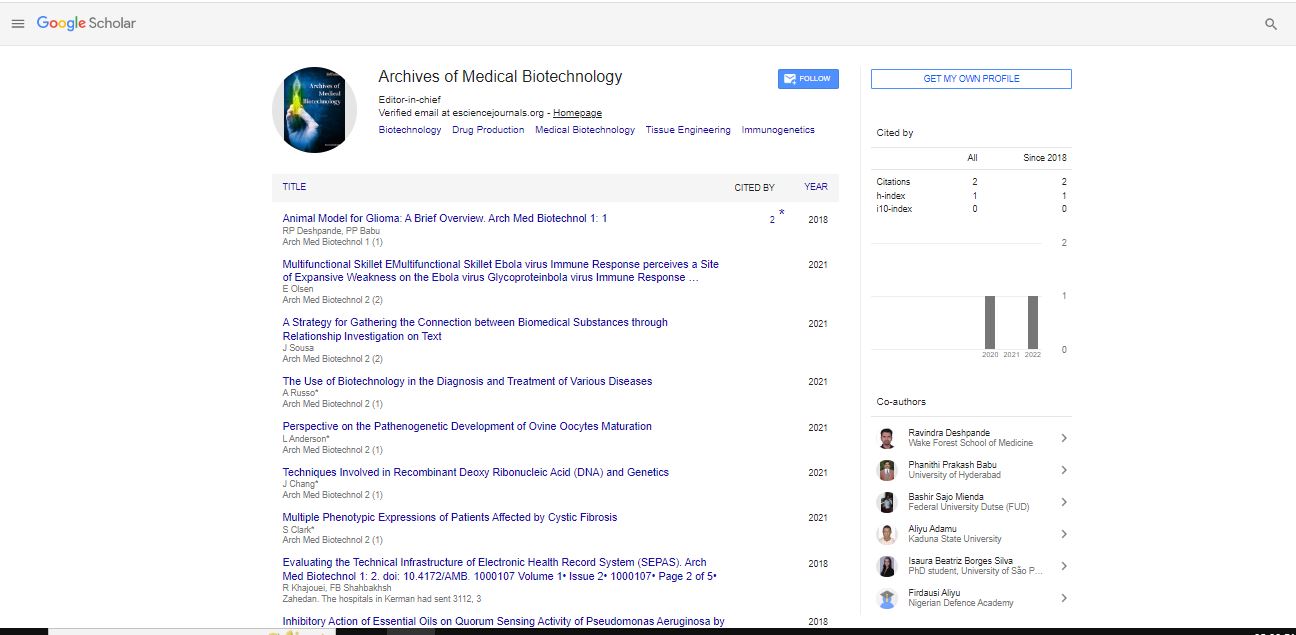Editorial, Arch Med Biotechnol Vol: 6 Issue: 1
Medical Biotechnology in Infectious Disease Management
Kavita Reddy*
Department of Biotechnology, Indian Institute of Science (IISc), Bengaluru, India
- *Corresponding Author:
- Kavita Reddy
Department of Biotechnology, Indian Institute of Science (IISc), Bengaluru, India
E-mail: kavita.reddy@iisc.ac.in
Received: 01-Mar-2025, Manuscript No. AMB-25-170187; Editor assigned: 4-Mar-2025, Pre-QC No. AMB-25-170187 (PQ); Reviewed: 20-Mar-2025, QC No AMB-25-170187; Revised: 26-Mar- 2025, Manuscript No. AMB-25-170187 (R); Published: 30-Mar-2025, DOI: 10.4172/amb.10000
Citation: Kavita Reddy, Department of Biotechnology, Indian Institute of Science (IISc), Bengaluru, India. Arch Med Biotechnol 6:1.
Copyright: © 2025 Kavita Reddy, this is an open-access article distributed under the terms of the Creative Commons Attribution License, which permits unrestricted use, distribution, and reproduction in any medium, provided the original author and source are credited.
INTRODUCTION
Medical biotechnology has transformed the landscape of infectious disease management through vaccines, diagnostics, and therapeutic innovations. In India, where diseases like tuberculosis, dengue, and malaria remain endemic, biotechnology-driven solutions are vital for effective control and prevention [1].
Biotechnology in Diagnosis and Therapy
Recombinant DNA technology has enabled the development of highly sensitive molecular diagnostics, including PCR-based tests for rapid detection of pathogens. The COVID-19 pandemic highlighted the power of biotechnology, with indigenous diagnostic kits and vaccines developed in record time [2]. In therapeutics, monoclonal antibodies are increasingly used to treat viral infections and sepsis in children. Advances in recombinant protein vaccines, such as those against hepatitis B, have significantly reduced disease burden [3]. Moreover, DNA and mRNA vaccines are being explored for diseases like malaria and tuberculosis, potentially offering long-term protection [4].
FUTURE DIRECTIONS
Cost of biotechnology-based interventions and the need for cold-chain logistics are key challenges in India. However, efforts to develop thermostable vaccines and portable diagnostic devices offer promising solutions. Integration of nanotechnology and AI-based diagnostics is expected to further strengthen infectious disease control [5].
REFERENCES
- Sharma A. Biotechnology approaches in infectious diseases. Indian J Med Res. 2014;140: 573–578.
- Ella R. COVID-19 vaccine development in India. Lancet Infect Dis. 2021;21: 1037–1039.
- Aggarwal R. Recombinant vaccines in India: success and challenges. Indian Pediatr. 2010;47:897–904.
- Kaur G. DNA vaccines in infectious diseases. Indian J Biotechnol. 2012;11:159–165.
- Rao M. Nanobiotechnology for diagnostics. Indian J Med Microbiol. 2018;36:151–156.
 Spanish
Spanish  Chinese
Chinese  Russian
Russian  German
German  French
French  Japanese
Japanese  Portuguese
Portuguese  Hindi
Hindi 